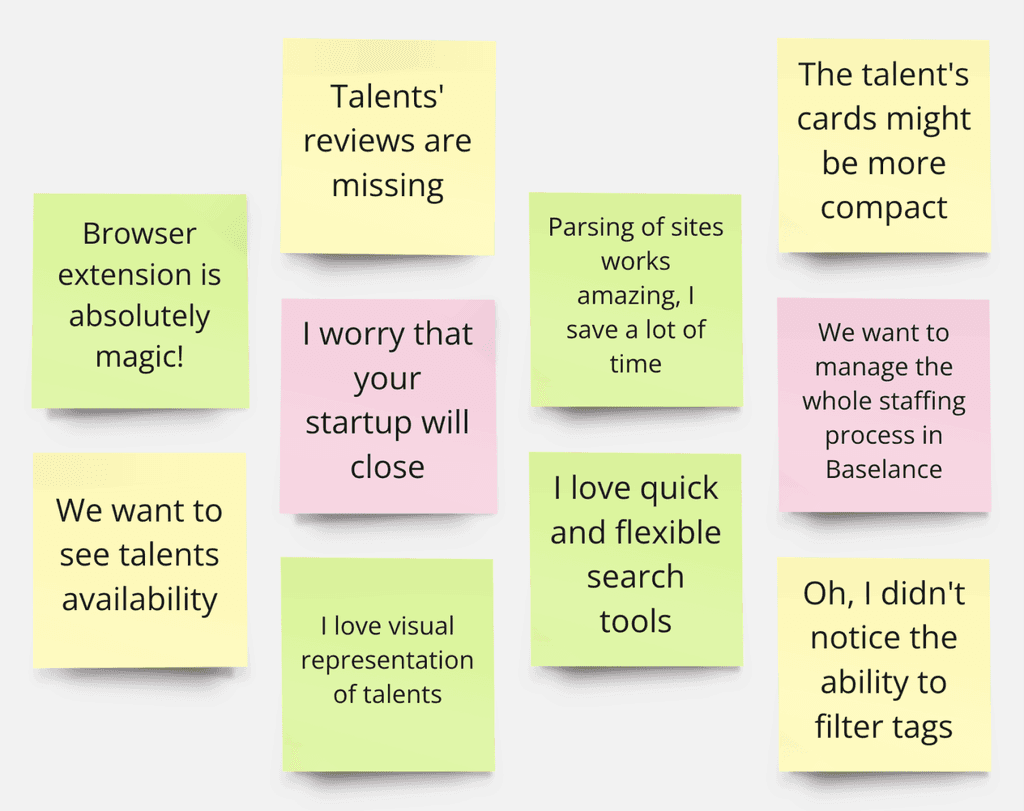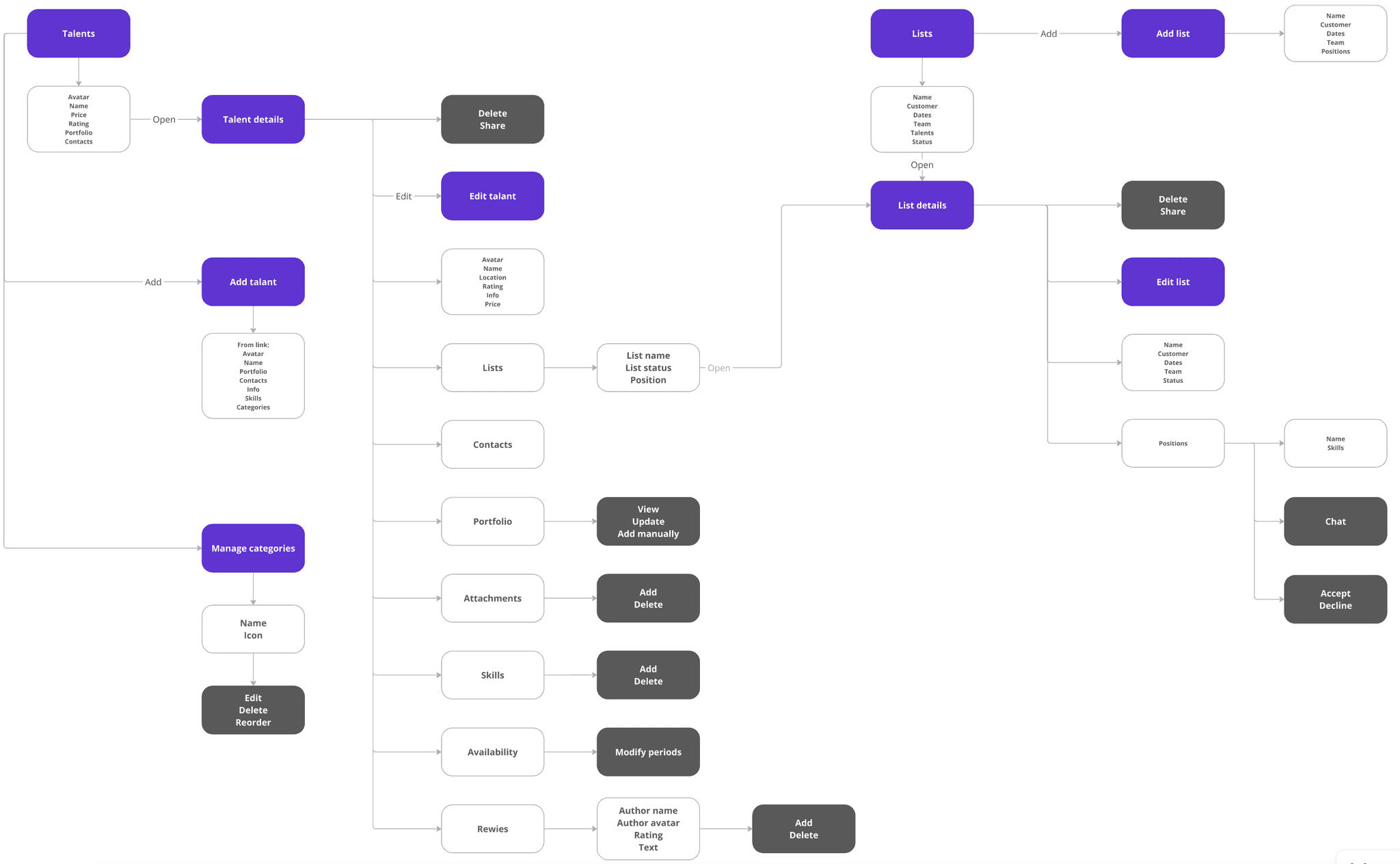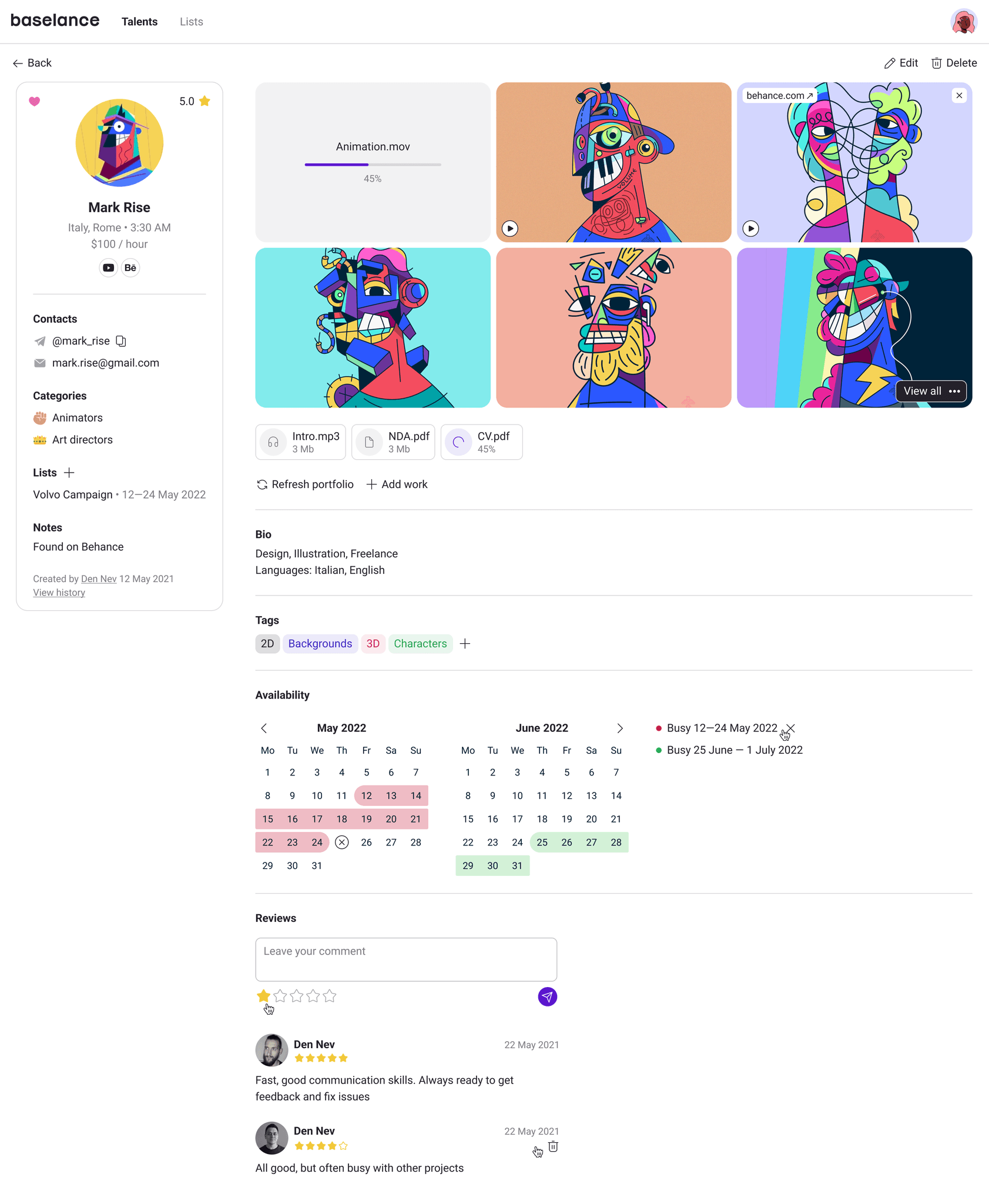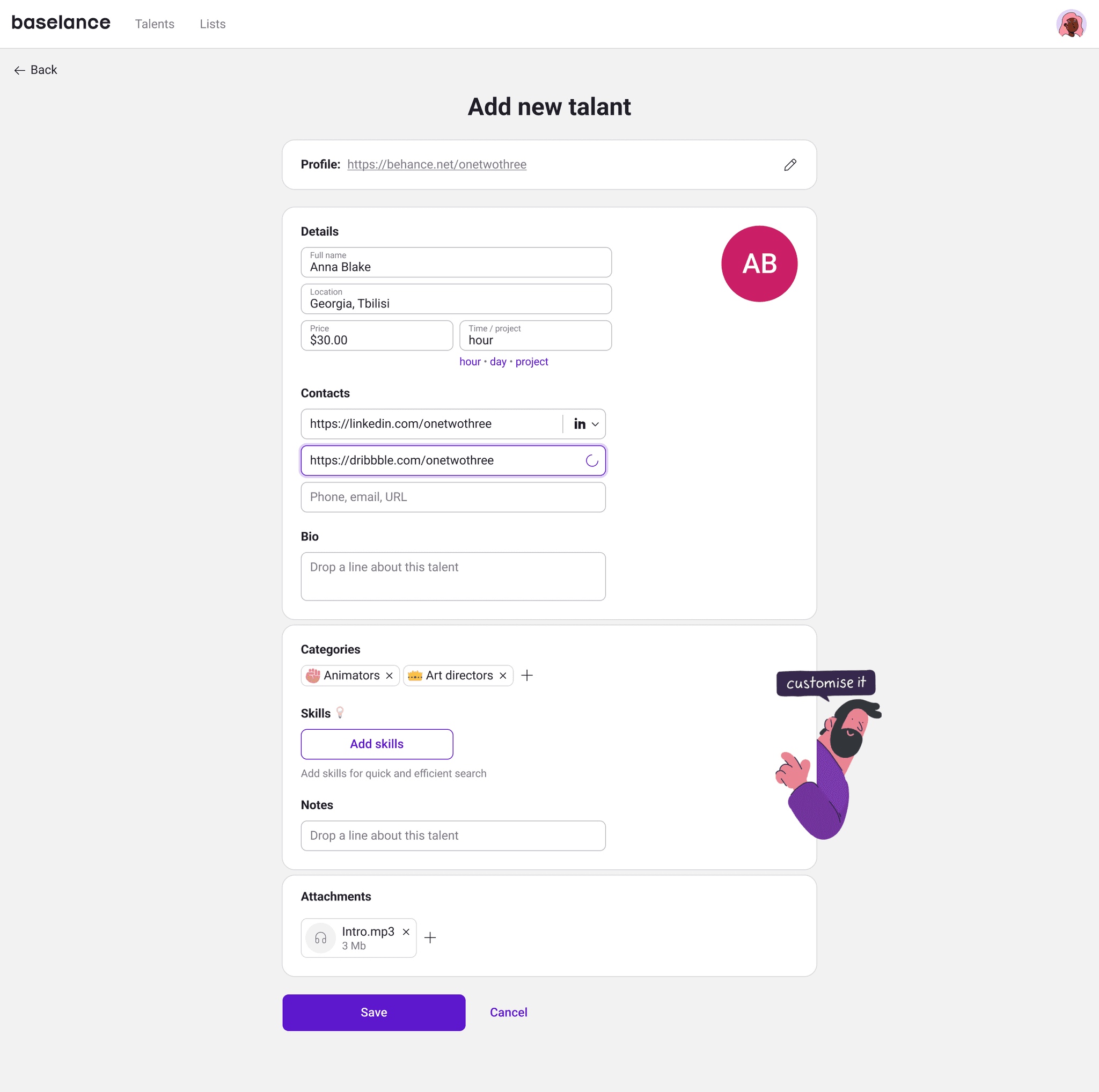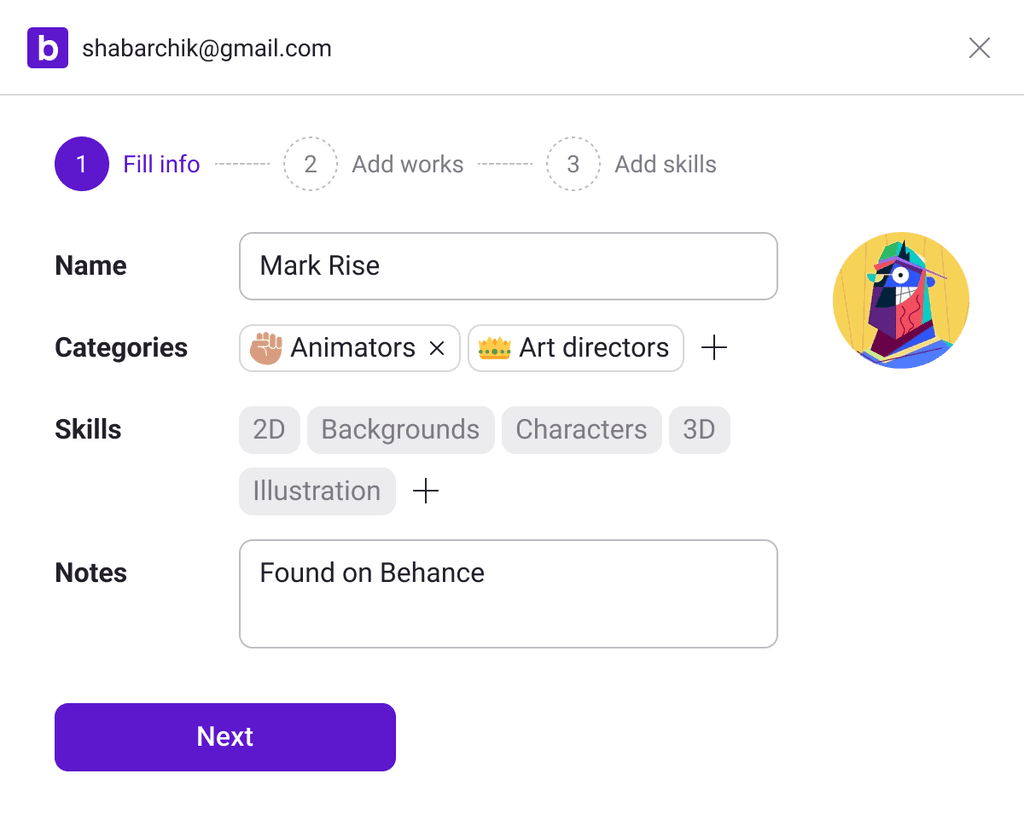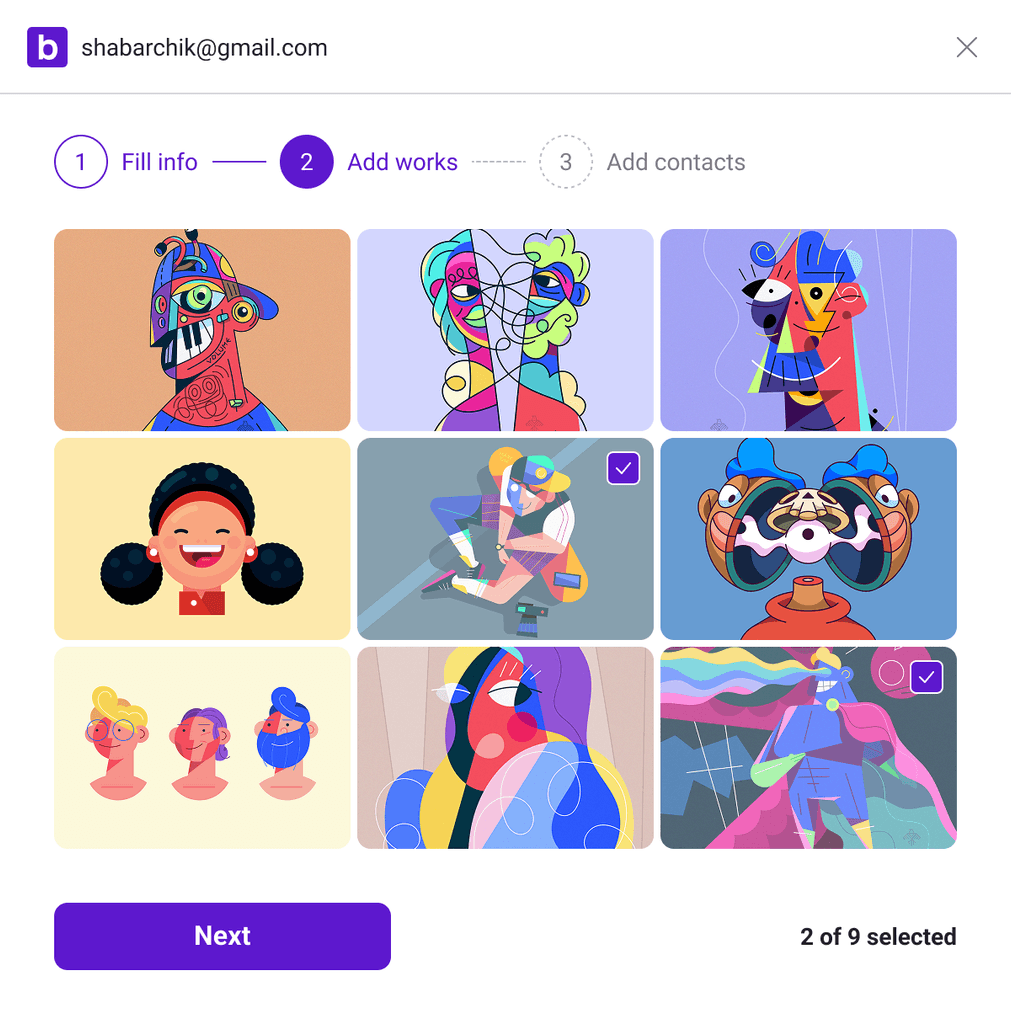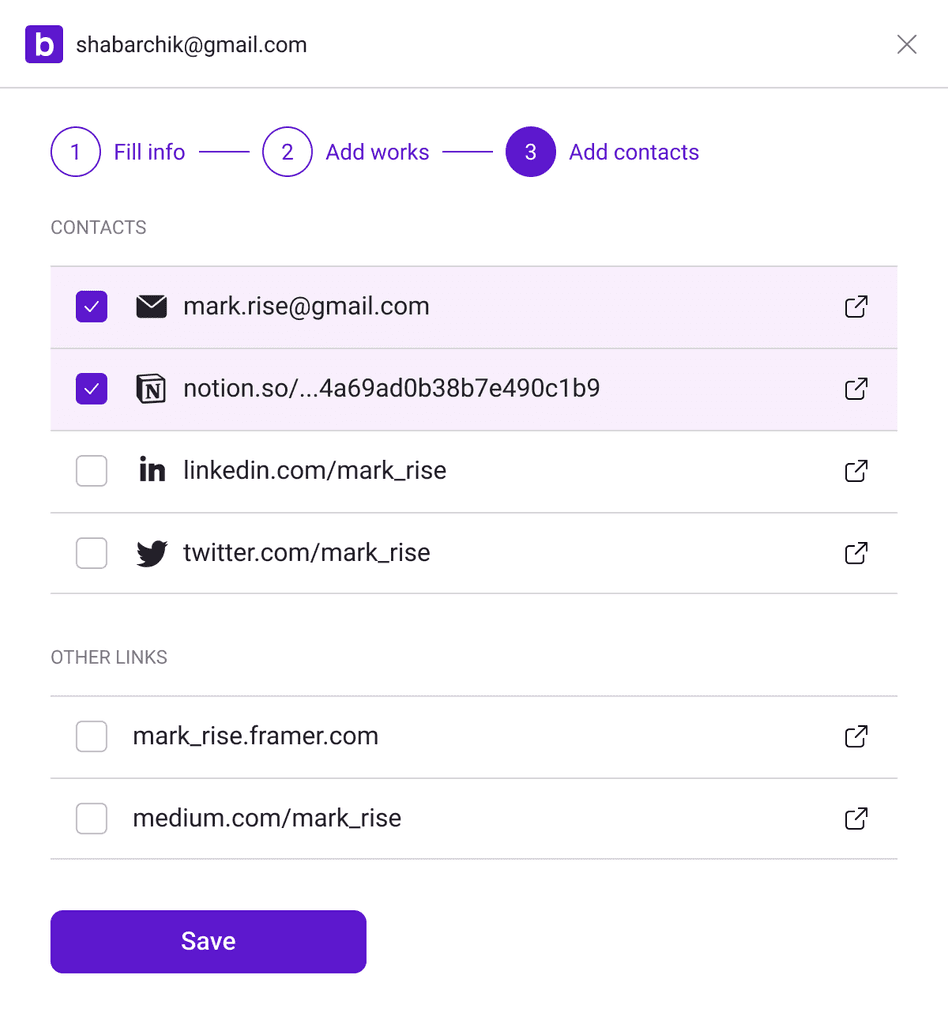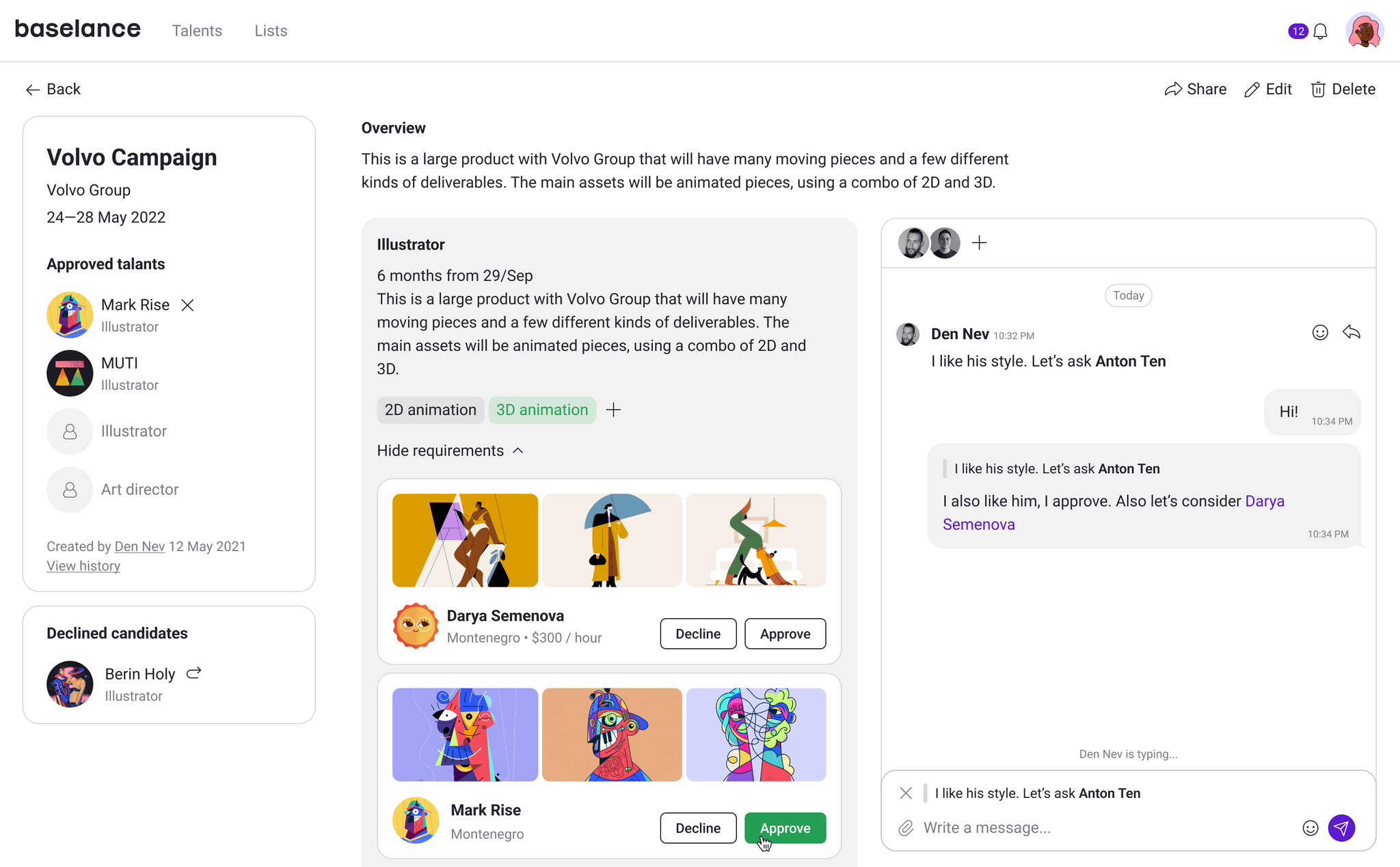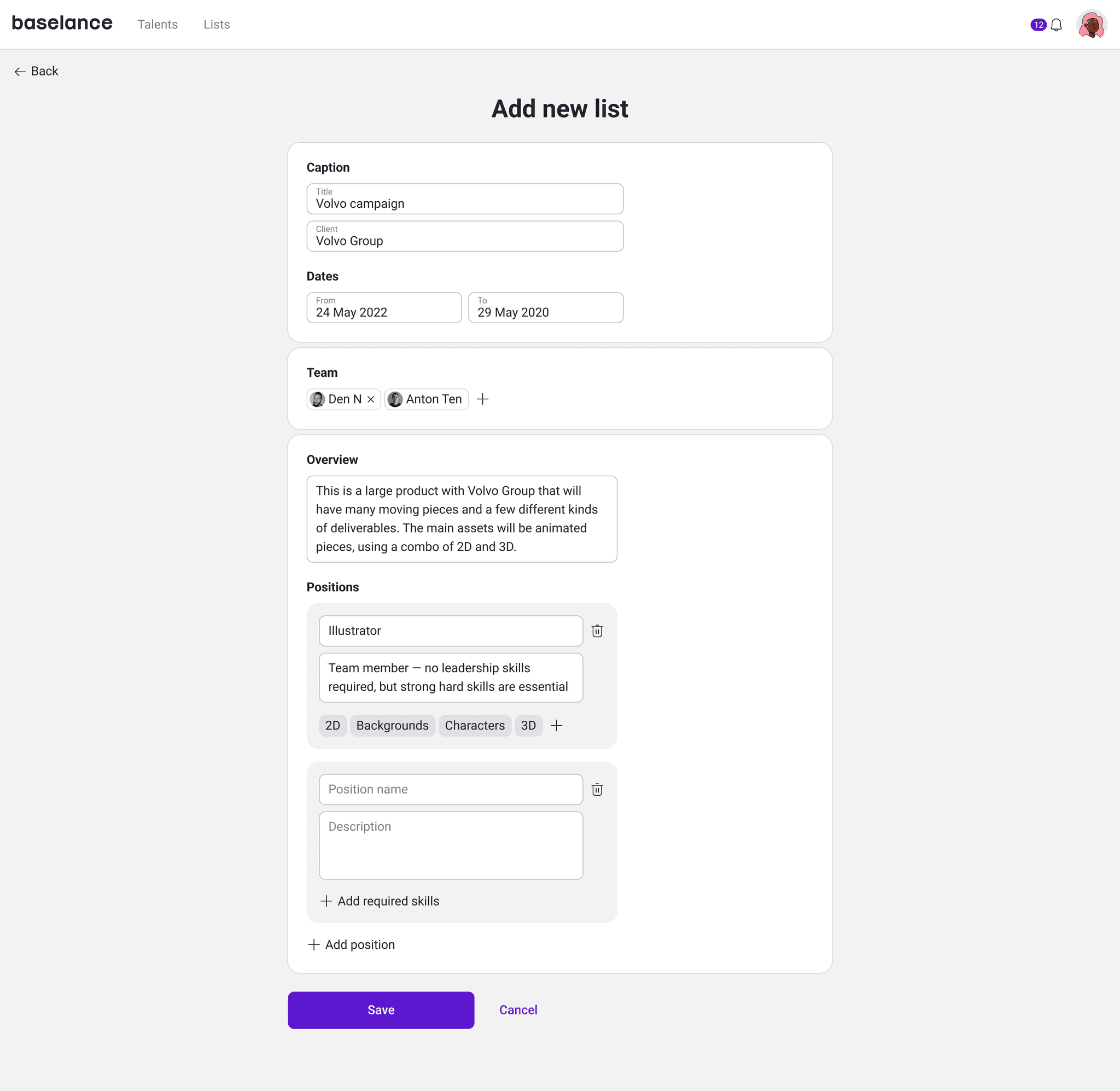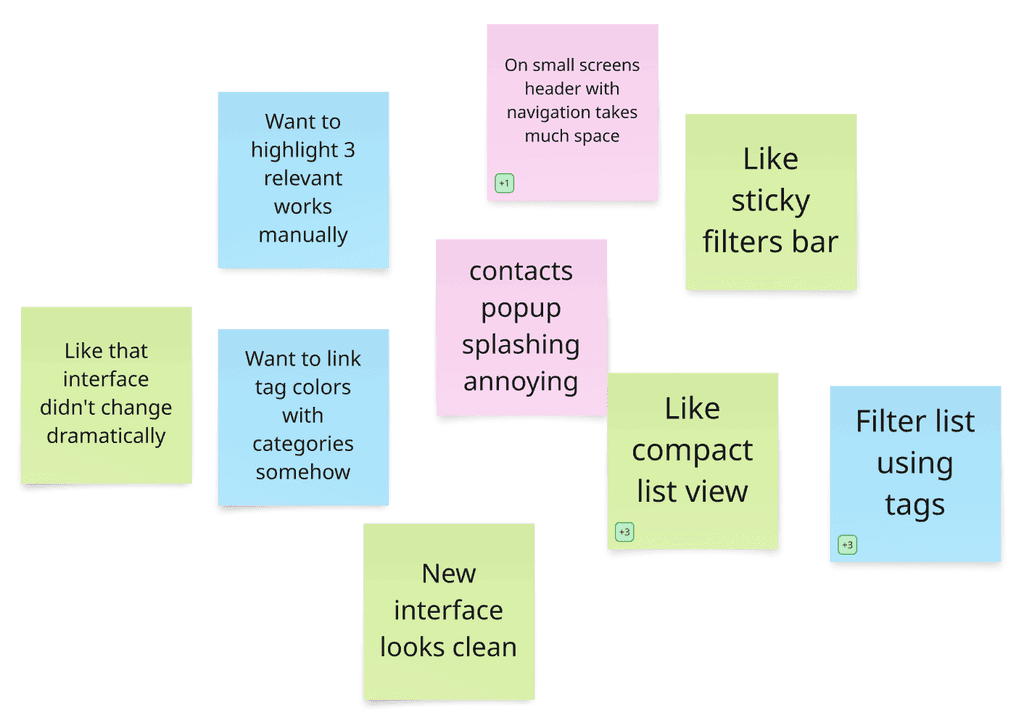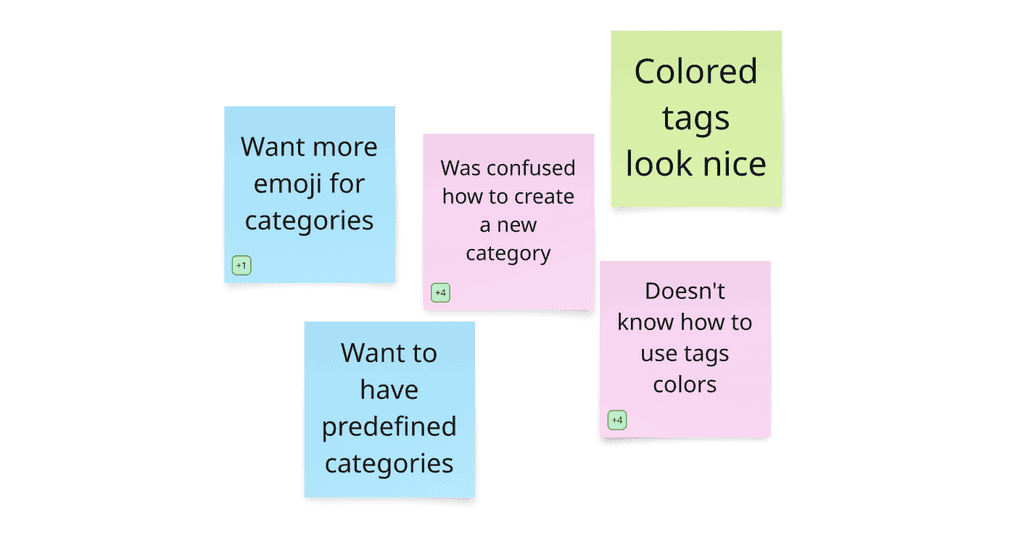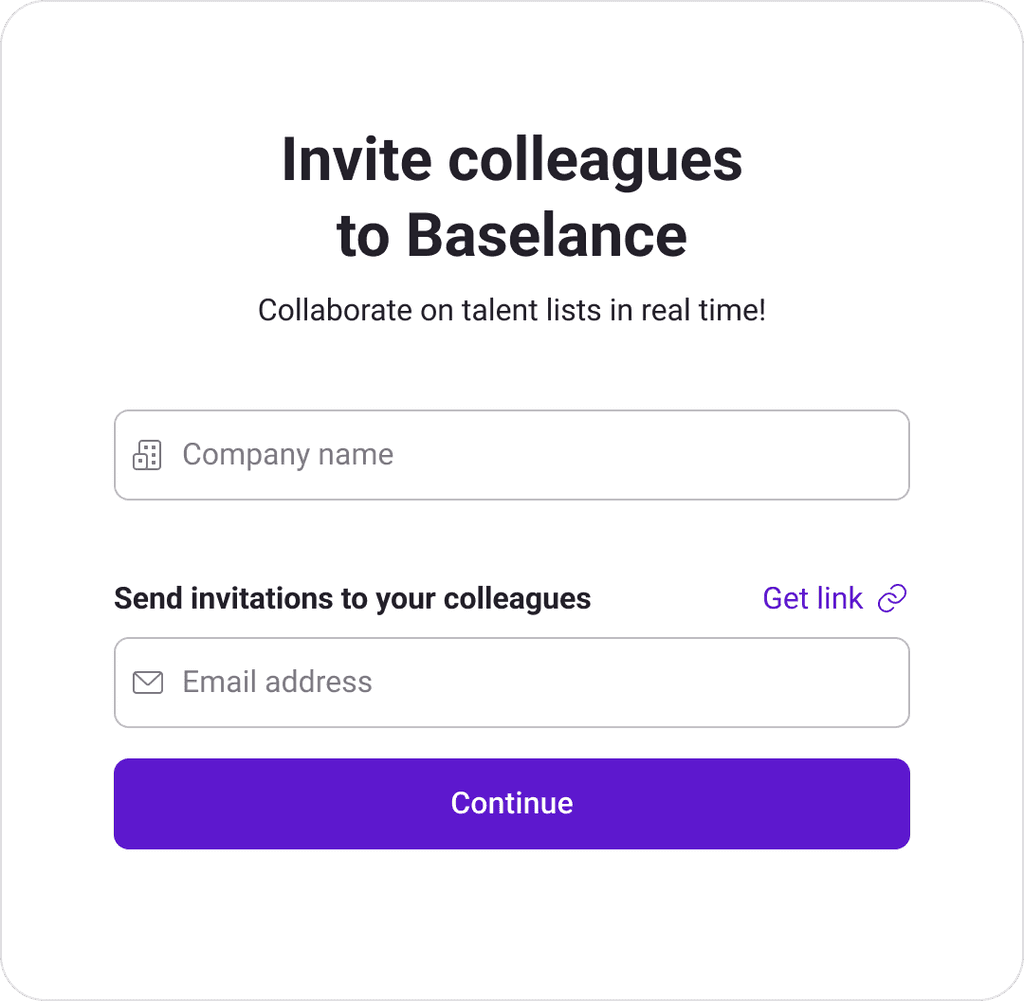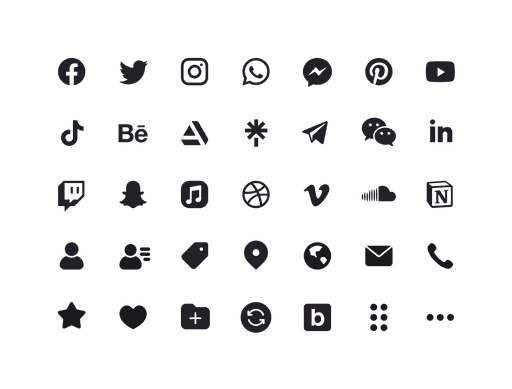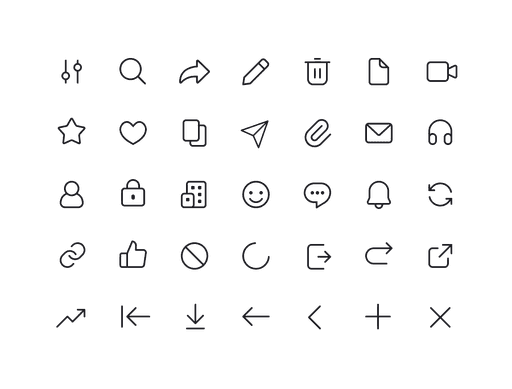Dates: 2021–2023
Type: Talent mgmt system • B2B • Startup
Market: USA • Europe
Role: Sole designer
Responsibilities: Design vision • Product design • Design system
Baselance is a B2B tool for creative industries, helping studios store and manage freelance talent profiles.
It started as a side project at Papaton Studio but quickly gained traction, becoming a favorite of over 50 agencies across the US and Europe.
Its key competitive advantage lies in the efficiency of adding new talent and the fast, flexible search powered by smart mechanics and a robust data parser.
When I joined the team, Baselance already existed and had proven its value through paid users. However, users were struggling with the interface and there was a list of complaints. Additionally, the architecture wasn’t scalable for new features, so it needed to be rethought.
Key metrics:
Time to first talent profile
Number of talent cards
WAU (weekly active users)
Feature adoption (search, projects lists)
Any startup operates with a high level of uncertainty. To bring more structure to the process, I outlined a few steps to maintain focus and deliver the right outcomes:
Dive into current customers’ experience
Get familiar with the top tools in the industry
Structure the functionality
Agree on the design vision
Work on the design concepts
Test solutions
To get familiar with the business area deeper and make the right decisions, we started with the interviews.
We asked about current users’ experience of using the Baselance: benefits & pains, hopes & anxieties and what additional needs or jobs we could potentially support.
Based on the answers we prepared a list of the current UX/UI issues and a high-level roadmap which will bring us closer to the goal:
Fully automated staffing process for the creative industry
Currently there is no similar tool on the market, but there are a lot of other tools which our customers use every day. We looked at the 2 types of tools:
Where our customers search for talents.
Other talent and freelance management systems, even though they aren’t focused on visual portfolios.
Before moving to Figma, I always prepare the flow architecture using a schematic. It helps me see the big picture and communicate more clearly with the team.
Our redesign strategy is based on the customer’s feedback and our vision of the product’s future. We made a manifest which helped us keep focused:
The talent list is the most important part of the product. While designing this page, I focused on 3 main requirements:
The portfolio should be easy to scan, while keeping the cards compact.
Tag filtering is the primary search tool, so it should always be visible.
The design should be clean and simple, yet include all essential information.
Talent details includes all information about the talent. Here we can find:
Profile overview
Contacts
Portfolio and other attachments
Tags
Availability
Lists (projects)
Special attention was given to the mechanics. I designed a consistent experience for adding tags and categories. A smooth and efficient flow is achieved through keyboard interactions.
For adding availability periods, I used a similar mechanic, enhanced with color selection.
One of Baselance’s biggest strengths is its smart data parser, which can pull information from various platforms and even custom websites via a link. It can import the avatar, portfolio, bio, and contact details.
If I were working on Baselance now, I’d suggest using AI to suggest skills and categories based on the images in the portfolio and the bio.
When a user adds a talent for the first time, we introduce our characters to guide them through the main actions and add a bit of fun to the experience.
Add new talent form
There’s another smart and even more popular way to add talents — our browser extension.
Users don’t need to open Baselance. They can add new talents directly from the talent’s profile page.
Baselance browser extension
The process is split into 3 steps to make each one simpler:
Fill out the talent overview
Select portfolio works
Add contact information
Fill out the talent overview
Select portfolio works
Add contact information
Lists
Lists / Projects is a new Baselance feature — the next step in automating the staffing process.
Now users can:
Suggest talents for different projects
Discuss candidates in a live chat
Approve or decline talents for various positions
Many of our users had been waiting for this feature — and started using it right away.
List details
Add new list form
The final tests confirmed that the new solution made adding talents 3 times more efficient.
Search for a talent
Add new talent
After implementing the new interface, the number of weekly active users increased by 27% within one month. This indicates that existing users started using Baselance more frequently, as there were no new signups during this period.
The number of talent cards also grew by 18% in the same month — a significant improvement compared to previous months' growth.
But to be honest, despite the product being loved by users, its most important problems are still unresolved.
The market is limited to the creative industry.
Attracting B2B customers is quite expensive, and it's difficult to price the product in a way that supports a sustainable unit economy.
Studios often hesitate to trust startups or move their data, as many startups shut down every day.
A scalable and consistent atomic design system, covering everything from tokens to layouts, was developed from scratch.
Toggle switch
Talent card
I'm convinced that icons have a strong impact on the overall look and feel of an interface. These tiny elements can make a product appear neat and polished—or messy and inconsistent. That’s why I always pay special attention to them in every product I work on.
For Baselance, I created 2 sets of beautiful, precise icons, along with clear and well-structured guidelines for the design system.
Every icon is precisely aligned to the pixel grid and follows visual weight guides for consistency.




1.
A scalable and consistent atomic design system, covering everything from tokens to layouts, was developed from scratch
2.
Two sets of precise icons were created, along with detailed guidelines
